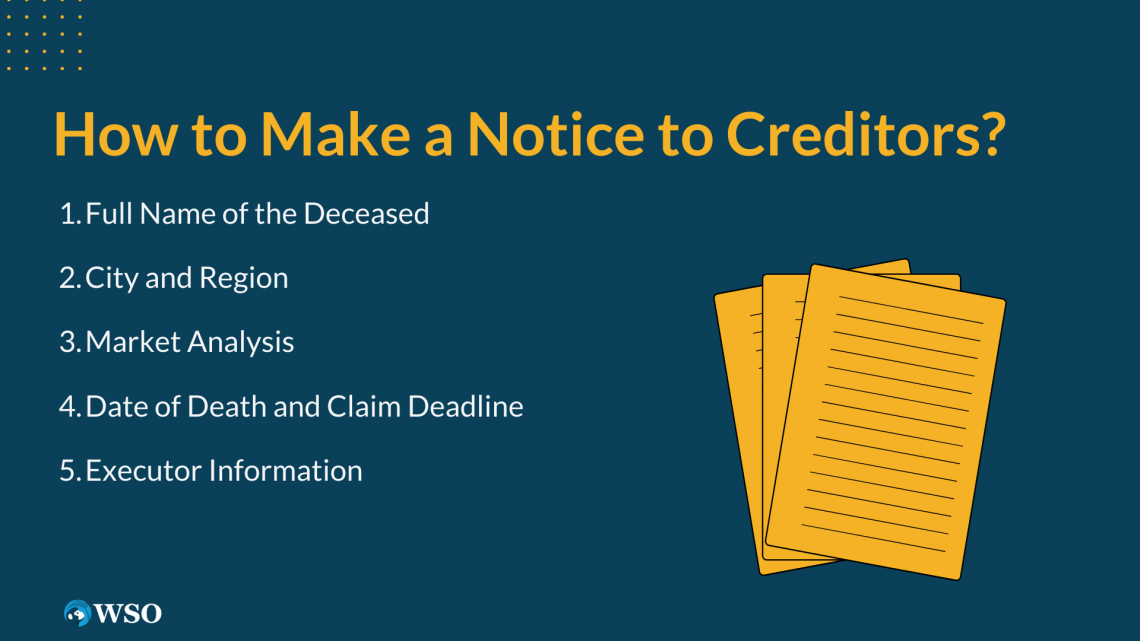Notice to Creditors
It is a notification informing creditors that a debtor has passed away.
A Notice to Creditors serves as a public announcement regarding the death of an asset holder. This notice is sometimes delivered directly to a creditor; other times, a public press release in a newspaper is issued to spread the message.

The objective of the notice is to notify all creditors of the deceased person and provides them the chance to claim anything that the deceased individual owed. During this time, this notice remains published in newspapers or magazines for several weeks.
This notice is part of the probate process of a will. While probate is being processed, a creditor is open to claim any debts the deceased individual had to pay.
While most creditors find satisfaction in the newspaper notice, larger and well-known creditors often require a direct notice to ensure they are adequately informed. If any payments of outstanding debts still need to be paid off, the inheritor or executor will take on these payments.
On top of paying back all outstanding debts, the executor will also be charged with collecting any monies owed to the estate as part of their duties.
Key Takeaways
- A Notice to Creditors is a notification informing creditors that a debtor has passed away.
- A Notice can be issued publicly or privately to the creditors.
- Creditors can choose to pursue any of the deceased’s outstanding debts.
- When notices are made, an executor is assigned to handle estates and payments.
Who are Creditors?
Creditors are people or companies that give out money to an individual. This money is paid back in good faith and often with interest.

Creditors can be categorized into two: Personal and Real.
1. Personal Creditors
As the name implies, personal creditors are individuals or entities with a personal relationship with the borrower. Family members, friends, or other personal connections are considered personal creditors when they loan out money.
Another version of personal creditors is small businesses that give out loans to help other businesses.
The difference between personal loans and commercial loans is the fact that these loans have more relaxed terms. Often, a borrower will take out extremely small denominations from these creditors to finance smaller purchases.
Often, these loans will have a small interest rate or even no interest on them.
2. Real Creditors
Real creditors typically refer to larger institutions like banks that provide loans. The main difference in these loans is the legal contracts. These loans will have long contracts that dictate how the loan will be paid, the loan term, and the collateral.
These loans give lenders the right to collect collateral if the borrower defaults. These loans are much more strict; your loan contract must be followed. If not, the bank may cancel your loan and demand full repayment. These loans generally have a higher interest rate.
How Notices to Creditors Work
In the United States, when a person dies, probates are necessary actions to pass down assets to the next generation. Another option would be to use a non-probate transfer of assets such as the trust's joint accounts, life insurance, or other means.

This system of passing down assets is also known as “avoiding probate.” It is a viable option for smaller estates or assets of lesser value, although some states have thresholds that require probate.
Certain situations may require probate, including objections by interested parties, assets that necessitate probate due to specific issues, or suspected fraud. If any of these reasons are deemed true, a probate case will be opened, and the process to pass assets will be decided.
Although newspapers are less efficient and have a smaller reach than digital and online media, they are still the most commonly used medium to provide notice to outstanding creditors. Though, not all creditors are accustomed to notices by social media.
Note
It is advisable to check with local or state newspapers to determine if they allow posting notices to creditors, as it may be a more cost-effective option with a broader audience.
Once the notice is published, it is up to the creditor to determine whether they would like to claim an outstanding debt or leave the matter. If a creditor decides to claim a debt, it would be up to the executor to pay off any debts owed.
Although notice of creditor is mainly seen as a way to pass down assets in the form of inheritance after the death of a close relative, friend, or loved one. A notice is also used when a person files for bankruptcy. During this time, a notice is used to call creditors.

This notice is filed before the first meeting of creditors or a 341 meeting. Individuals filing for Chapter 7 or 13 bankruptcy will be required to attend a meeting with their creditors and the bankruptcy trustee they have assigned.
When creditors join this meeting, they will be allowed to ask questions regarding the nature of the bankruptcy, what the individual will do after it, and possible ways to regain any lost money.
Probate Court
Probate court is the legal system that involves handling the estate and assets of a recently deceased person and ensuring that their debts, assets, and any other obligations are handled efficiently and according to the deceased individual's wishes.

This is a long and strenuous system as each part of a will should be thoroughly followed and pass every legal barrier, such as obligations of debt, inheritance of assets, and handling of estates.
It is important to understand your state's laws when regarding probate. Some states will refer to probate with different terms, such as Orphans Court, Chancery Court, or Surrogate's Court.
Understanding the laws and regulations specific to your state is crucial, as the outcome in one state's probate court may differ from another. A probate court will start when a person files a petition for probate. The state will then honor that petition and start the process of probate.
Note
Be aware that probate court proceedings involve significant fees. Hiring a probate lawyer and covering court, publishing, and executor fees are part of the associated costs.
The first objective of the system is to appoint an executor. This executor assumes the responsibility for paying off any debts the deceased still owes. In addition, they will also be in charge of handling estates passing down any assets to all beneficiaries, and other administrative duties.
To do this, the court will give the executor the full authority to pay bills, sell assets and perform other tasks to see the will followed through.
Once given the power, the executor will have to notify all those to whom the deceased owes money (creditors) and inform beneficiaries of their inheritance. They are also responsible for filing taxes and settling any outstanding debts.

The first part of this system is to pay back any debt owed to creditors. Once this is done, the executor will give out the remaining assets to any beneficiaries listed in the will.
Of course, there are times when the executor will not listen to a claim and object to it outright. In such cases, the court must hear evidence and rule on the claim's legitimacy.
If a creditor wins, the claim will go through, and the executor will still be obligated to pay back the debt. If the executor wins, the debt will be resolved and ruled void.
How to Make a Notice to Creditors?
The notice should have a multitude of things included within it to make it legal. These are:

1. Full Name of the Deceased
The notice should ensure that it contains the full name of the deceased individual. This includes the individual's first, middle, last, and maiden name.
2. City and Region
The city and region of the deceased individual should also be stated.
3. Date of Death and Claim Deadline
The most important part is the date of death and the deadline by which a claimant can repossess lost debt. Usually, all creditors have a 30-day period for them to bring any claims forward.
4. Executor Information
The notice should contain the executor of the probate. It should also include all contact and relevant information of any estate’s assets or outstanding debts the borrower still owed.
All the important elements stated above should be included to create a proper notice to creditors. The purpose of the notice is to inform outstanding creditors and other claimants about a borrower's death.
Here is an example of a properly written notice:
Notice to Creditors
In the matter of the estate of [Full Name of Deceased], late of [City, Region], who passed away on [Date of Death]. All creditors and claimants are hereby notified that they must present their claims within 30 days from the date of this notice.
The executor of the probate is [Executor's Full Name]. Any inquiries or claims should be directed to [Executor's Contact Information]. Further information regarding the estate's assets and outstanding debts can be obtained from the executor.
Dated: [Date]
[Executor's Full Name]
Executor of the Estate
[Contact Information]
Summary
Notice to creditors is a mandatory process when dealing with inheritance. These notices give creditors and other lenders an important message about a borrower's outstanding debts.

These notices can be made publicly or privately, depending on the creditor's preferences. Public notices are commonly placed in newspapers or magazines, while private notices are typically reserved for larger institutions or significant debts.
These private notices are often made if the outstanding debt is in a large denomination or is an important part of the deceased's financial costs.
Regardless of the form of the notice, the notice should contain critical information about the deceased. This includes their name, the state they reside in, their date of death, the date creditors have to claim any debts, and the contact information of the executor.

Once a notice is made, it's up to the creditors to decide if they wish to pursue any debts still owed. If the debts aren't small denominations or have nearly been paid off, most creditors will not file a claim against the executor.
If any large loans are still left, such as mortgages or vehicle payments, most creditors will likely seek out payment for these outstanding loans. It's up to the executor to pay off any debts owed and oversee any statements.
If the executor cannot make any payments with any cash the deceased left behind, they will most likely try to sell any assets not specifically stated in a will for cash to pay off the deceased debt.










or Want to Sign up with your social account?